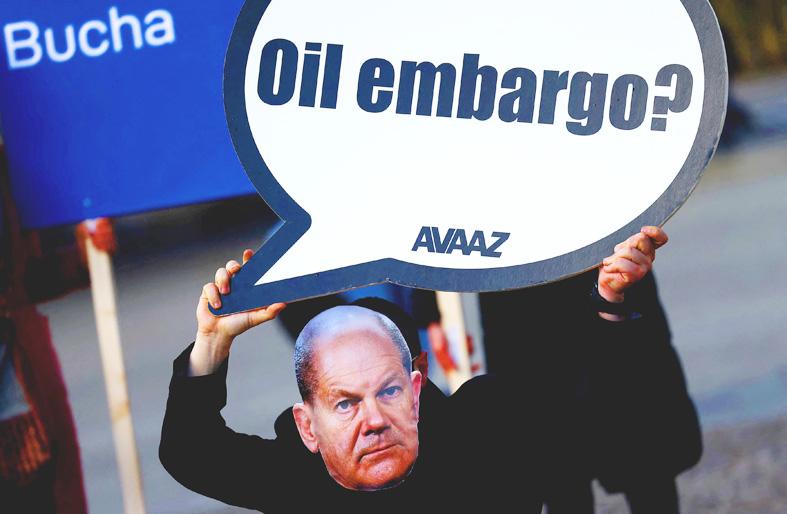Oil notched a weekly gain as traders weighed a global supply deficit, a potential ban on Russian oil from the EU and China’s latest COVID-19 lockdowns.
West Texas Intermediate (WTI) crude for May delivery on Friday gained US$2.70 to settle at US$106.95 per barrel, rising 8.8 percent for the week.
The June contract for the global benchmark Brent crude on Friday added US$2.92 to settle at US$111.70 per barrel. The contract rose 8.7 percent weekly.

Photo: Reuters
Oil rallied on Thursday afternoon after a report that the EU is moving toward adopting a phased-in ban on Russian oil.
Russian President Vladimir Putin earlier this week vowed to continue the invasion of Ukraine, pointing to a prolonged disruption of Russia’s energy exports.
Additionally, the International Energy Agency said in a report that OPEC+ members provided only 10 percent of their promised supply increases last month.
In the US, crude stockpiles jumped more than 9 million barrels last week, with over one-third of the build attributed to the shift of strategic oil reserves to commercial inventories. At the same time, most stocks of refined products fell, prompting a spike in so-called crack spreads — the rough profit from turning crude into fuel.
“Traders realize a good portion of that came from the strategic reserve, which now sets [sic] at 20 year inventory lows,” BOK Financial Corp senior vice president of trading Dennis Kissler said. “Crude storage remains 60.45 million barrels below the five-year average which should keep the buyers active on extreme sell offs.”
The oil market has seen a tumultuous period of trading since Russia invaded its neighbor in late February. A recent reserve release by the US and its allies, along with a virus resurgence in China, has weighed on prices in the past few weeks.
Yet there are some signs of easing COVID-19 restrictions and China’s central bank is expected to take measures to help bolster a faltering economy.
“Government energy intervention, the perceived self-shunning of Russian crude and the erratic buying patterns in recent weeks have all altered the near-term path,” RBC Capital Markets analyst Mike Tran said.
Trading looks “volatile and sloppy over the near term as the market digests the onslaught of 240 million barrels of crude unleashed from strategic reserves.”
To be sure, the market is still in the grips of a liquidity crunch sparked by surging volatility after a spike toward US$140. Open interest in WTI futures fell to the lowest since 2016 on Wednesday, while traders are using options strategies as a way of effectively raising cash in the face of limited sources of capital.
Elsewhere, Kazakhstan expects its main oil-export route via Russia to restore full operations late this month, the country’s energy minister said.
The nation said it remains concerned about the possible impact of Western sanctions or shipping issues on the flow of crude.
Additional reporting by staff writer

KEEPING UP: The acquisition of a cleanroom in Taiwan would enable Micron to increase production in a market where demand continues to outpace supply, a Micron official said Micron Technology Inc has signed a letter of intent to buy a fabrication site in Taiwan from Powerchip Semiconductor Manufacturing Corp (力積電) for US$1.8 billion to expand its production of memory chips. Micron would take control of the P5 site in Miaoli County’s Tongluo Township (銅鑼) and plans to ramp up DRAM production in phases after the transaction closes in the second quarter, the company said in a statement on Saturday. The acquisition includes an existing 12 inch fab cleanroom of 27,871m2 and would further position Micron to address growing global demand for memory solutions, the company said. Micron expects the transaction to

Vincent Wei led fellow Singaporean farmers around an empty Malaysian plot, laying out plans for a greenhouse and rows of leafy vegetables. What he pitched was not just space for crops, but a lifeline for growers struggling to make ends meet in a city-state with high prices and little vacant land. The future agriculture hub is part of a joint special economic zone launched last year by the two neighbors, expected to cost US$123 million and produce 10,000 tonnes of fresh produce annually. It is attracting Singaporean farmers with promises of cheaper land, labor and energy just over the border.

US actor Matthew McConaughey has filed recordings of his image and voice with US patent authorities to protect them from unauthorized usage by artificial intelligence (AI) platforms, a representative said earlier this week. Several video clips and audio recordings were registered by the commercial arm of the Just Keep Livin’ Foundation, a non-profit created by the Oscar-winning actor and his wife, Camila, according to the US Patent and Trademark Office database. Many artists are increasingly concerned about the uncontrolled use of their image via generative AI since the rollout of ChatGPT and other AI-powered tools. Several US states have adopted

A proposed billionaires’ tax in California has ignited a political uproar in Silicon Valley, with tech titans threatening to leave the state while California Governor Gavin Newsom of the Democratic Party maneuvers to defeat a levy that he fears would lead to an exodus of wealth. A technology mecca, California has more billionaires than any other US state — a few hundred, by some estimates. About half its personal income tax revenue, a financial backbone in the nearly US$350 billion budget, comes from the top 1 percent of earners. A large healthcare union is attempting to place a proposal before